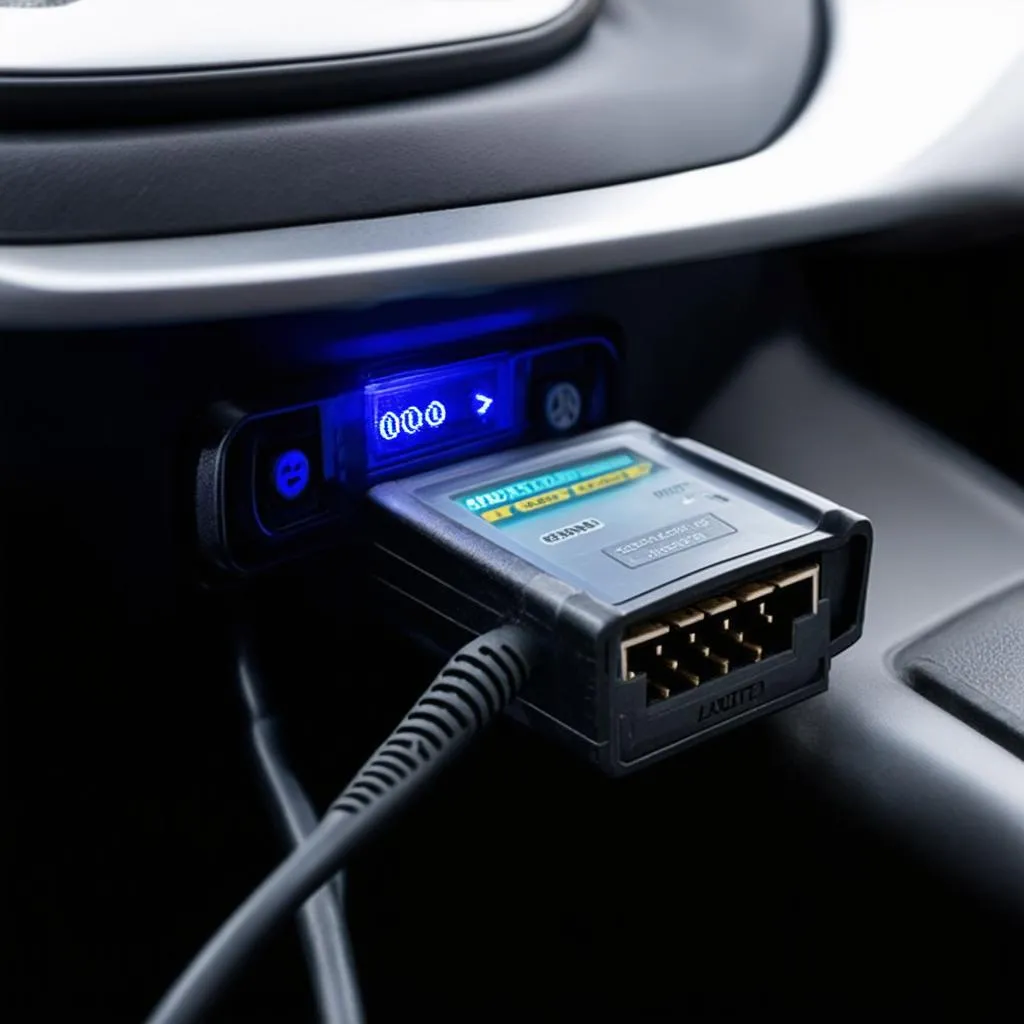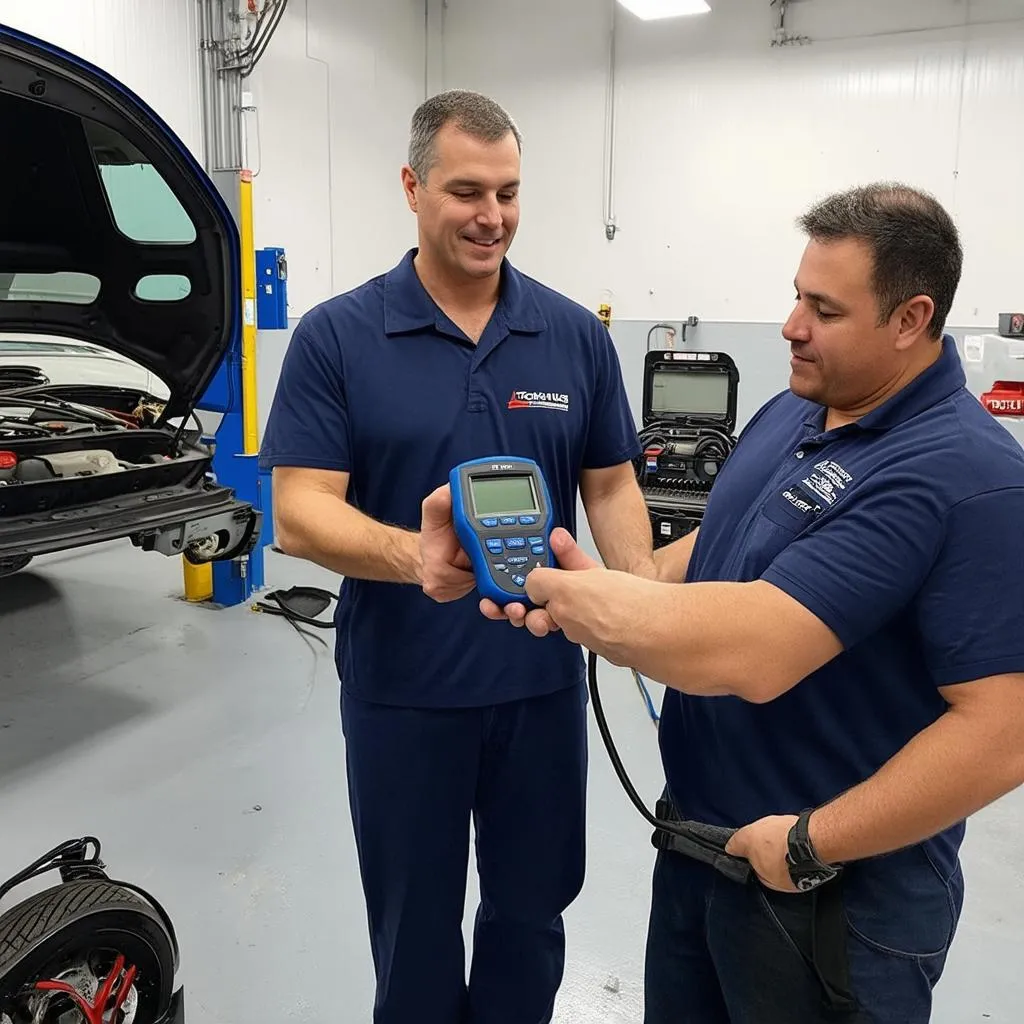Have you ever wondered what that mysterious port under your car’s dashboard is for? Or perhaps you’ve experienced a check engine light that’s leaving you scratching your head. Welcome to the world of OBD scanners, your car’s secret weapon for diagnosing problems and keeping it running smoothly.
What Is An Obd Scanner: Demystifying the Technology
An OBD scanner, short for On-Board Diagnostics, is a handheld device that plugs into your car’s diagnostic port and allows you to access and interpret its internal data. Think of it as a tiny detective, sniffing out any potential issues lurking within your vehicle’s intricate network of sensors and systems.
The Importance of OBD Scanners: Why You Need One
The Car’s Language: Understanding Your Vehicle’s Codes
OBD scanners are like translators, interpreting the cryptic codes your car uses to communicate its health status. When your check engine light illuminates, an OBD scanner can tell you exactly what’s going on, from a loose gas cap to a more serious issue like a failing sensor.
Saving Money: Diagnosis Before Breakdown
By detecting problems early, OBD scanners can help you avoid costly repairs. Imagine your car’s check engine light flickering, but you’re unsure of the cause. Instead of rushing to the mechanic and potentially shelling out hundreds of dollars for a diagnosis, an OBD scanner can provide immediate insight, potentially saving you a significant amount of money.
Taking Control: Empowering You as a Car Owner
With an OBD scanner, you become more than just a driver; you become your car’s advocate. You can monitor your vehicle’s performance, track fuel efficiency, and even reset check engine lights after addressing minor issues. This knowledge empowers you to make informed decisions about your car’s maintenance and repair.
The Intangible Benefits: Peace of Mind and Automotive Zen
In the spirit of harmony and balance, an OBD scanner can bring peace of mind to car ownership. Knowing that you have the tools to understand your car’s health can alleviate anxieties and lead to a more harmonious relationship with your vehicle. Just like feng shui harmonizes the energy of a space, an OBD scanner aligns you with your car’s needs, fostering a sense of well-being.
What Does an OBD Scanner Do? Exploring the Capabilities
OBD scanners have a diverse range of capabilities, each offering a unique perspective into your car’s well-being.
Reading and Interpreting Diagnostic Trouble Codes (DTCs)
This is the primary function of an OBD scanner. It reads DTCs stored in your car’s computer, which are essentially coded messages indicating any issues detected.
Accessing Live Data Streams
OBD scanners can display real-time data streams from your car’s sensors, allowing you to monitor parameters like engine speed, fuel pressure, and coolant temperature.
Clearing Trouble Codes
Once you’ve addressed a problem, your OBD scanner can clear the corresponding DTC from your car’s computer, effectively turning off the check engine light.
Performing Vehicle Tests
Some OBD scanners allow you to run specific tests on different car systems, such as the emissions system or ABS brakes.
Who Needs an OBD Scanner?
The truth is, anyone who owns a car can benefit from an OBD scanner.
- DIYers: If you enjoy working on your car, an OBD scanner is an invaluable tool.
- Experienced Mechanics: Even professionals use OBD scanners for advanced diagnostics and troubleshooting.
- Budget-Conscious Drivers: Obd scanners can help you identify potential issues early and avoid costly repairs.
- Eco-Conscious Drivers: OBD scanners can help you optimize your fuel economy.
Choosing the Right OBD Scanner: A Guide to the Options
OBD scanners come in various forms, each tailored to specific needs and preferences.
Basic OBD Scanners: The Essentials for Home Mechanics
These affordable scanners provide basic functionality, allowing you to read and clear DTCs. They are great for the average car owner who wants to understand the basics of their car’s health.
Advanced OBD Scanners: Unlocking Deeper Insights
These scanners offer more features, including live data streaming, graphing, and advanced diagnostics. They are ideal for experienced mechanics and those who want to delve deeper into their car’s workings.
Bluetooth OBD Scanners: Connecting to Your Smartphone
These wireless scanners connect to your smartphone via Bluetooth, allowing you to view data and analyze your car’s health using a dedicated app.
Wi-Fi OBD Scanners: Convenience and Connectivity
These scanners use Wi-Fi to connect to your smartphone or tablet, providing convenient access to diagnostic data.
Using Your OBD Scanner: Getting Started
Using an OBD scanner is surprisingly straightforward.
- Connect the Scanner: Plug the scanner into your car’s diagnostic port, usually located under the dashboard.
- Power Up: Turn the ignition key to the “ON” position but do not start the engine.
- Access the Menu: Use the scanner’s buttons or touchscreen to navigate its menu.
- Read DTCs: Locate the option to read trouble codes and interpret the results.
- Clear Codes: If you’ve addressed the issue, clear the codes from your car’s computer.
OBD Scanner FAQs: Addressing Your Burning Questions
What is the difference between OBD1 and OBD2?
OBD1 was the first generation of On-Board Diagnostics, introduced in 1996. OBD2, which became mandatory in 1996 for all vehicles sold in the US, offers a more standardized and robust system with enhanced diagnostic capabilities.
What is the difference between an OBD scanner and a code reader?
While “OBD scanner” and “code reader” are often used interchangeably, an OBD scanner offers a broader range of functionality. A code reader primarily reads and clears DTCs, while an OBD scanner can also access live data streams, perform tests, and provide more detailed information.
Can I use an OBD scanner on any car?
Most OBD scanners are compatible with vehicles manufactured after 1996, as this is when OBD2 became the standard. However, some older cars may require a specific adapter to work with OBD2 scanners.
What do the codes mean?
Different codes correspond to specific issues. OBD scanner manuals often provide a code lookup table, or you can search online for a code definition.
Are OBD scanners safe?
OBD scanners are generally safe to use. They connect to your car’s diagnostic port, which is specifically designed for this purpose.
Do I need to use an OBD scanner every time my check engine light comes on?
Not necessarily. If the check engine light is flashing, it’s best to have your car inspected by a mechanic immediately. However, if the light is steady, an OBD scanner can help you determine the cause and potentially address the issue yourself.
Are there any apps that work with an OBD scanner?
Yes, there are several apps that connect to Bluetooth or Wi-Fi OBD scanners, allowing you to access diagnostic data on your smartphone or tablet.
What are some popular OBD scanners?
Popular OBD scanners include the BlueDriver, BAFX Scanners, and Actron CP9690.
How do I choose the right OBD scanner for me?
Consider your needs, budget, and experience level when selecting an OBD scanner. If you’re just starting out, a basic OBD scanner may be sufficient. However, if you’re an experienced mechanic or want more advanced features, an advanced scanner might be a better choice.
Take Charge of Your Car’s Health with an OBD Scanner
OBD scanners are more than just diagnostic tools; they are your keys to understanding your car’s intricate workings. By empowering yourself with this knowledge, you can prevent costly repairs, ensure your vehicle’s longevity, and even cultivate a deeper connection with your trusty automotive companion.
 OBD Scanner Device
OBD Scanner Device
Need Help With Your OBD Scanner?
For expert assistance with OBD scanners and all your car diagnostic needs, reach out to our team at TechCarUSA. We are available 24/7 to provide support, guidance, and expert advice on all things automotive technology.
Contact us via WhatsApp: +84767531508
 Car Diagnostics Expert
Car Diagnostics Expert
Looking to delve deeper into specific aspects of OBD scanners? Check out these helpful articles:
- Free OBD Scanner for Windows: https://techcarusa.com/free-obd-scanner-for-windows/
- BMW OBD-II Scanner Software: https://techcarusa.com/bmw-obd-ii-scanner-software/
- OBD-1 Scanner: https://techcarusa.com/obd-1-scanner-2/
- 2007 Chevy Cobalt OBD Scanner Not Working: https://techcarusa.com/2007-chevy-cobalt-obd-scanner-not-working/
- Best OBD-II Bluetooth Scanner: https://techcarusa.com/best-obd-ii-bluetooth-scanner/
Let us know your thoughts in the comments below! We’re eager to hear your experiences with OBD scanners and answer any further questions you may have.